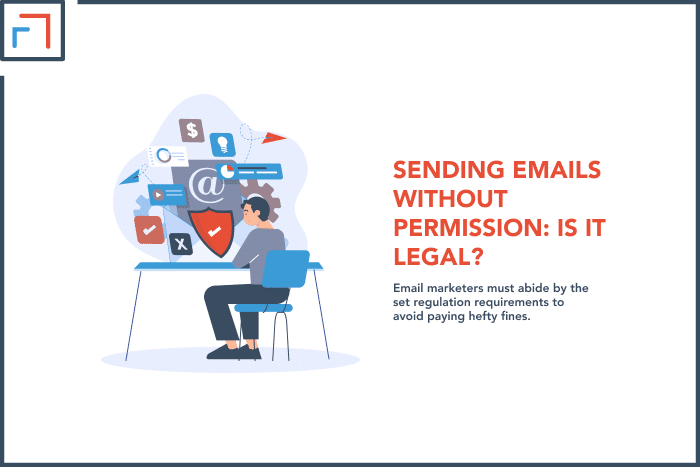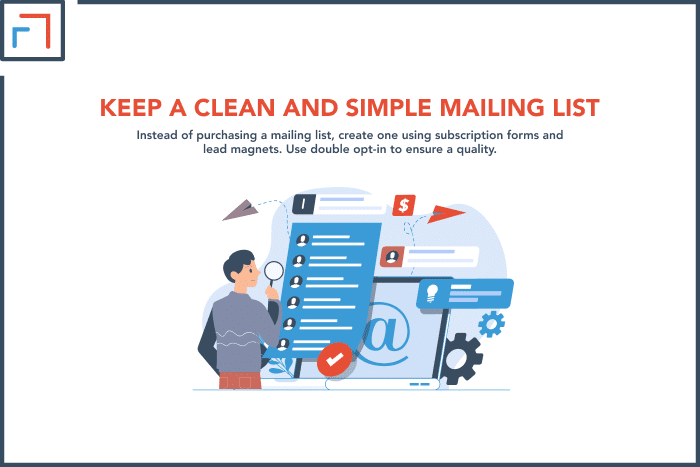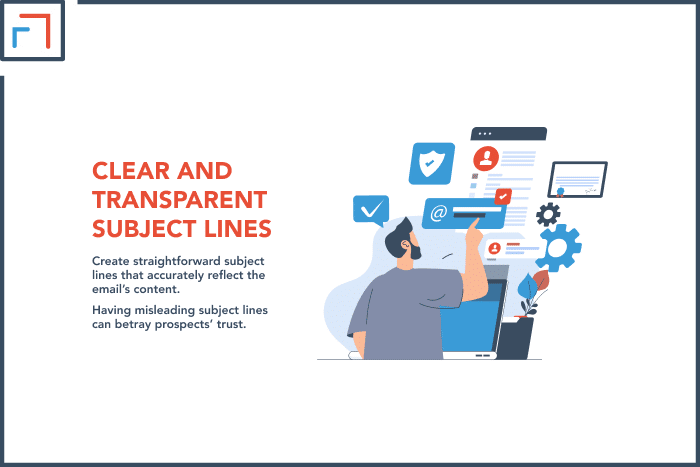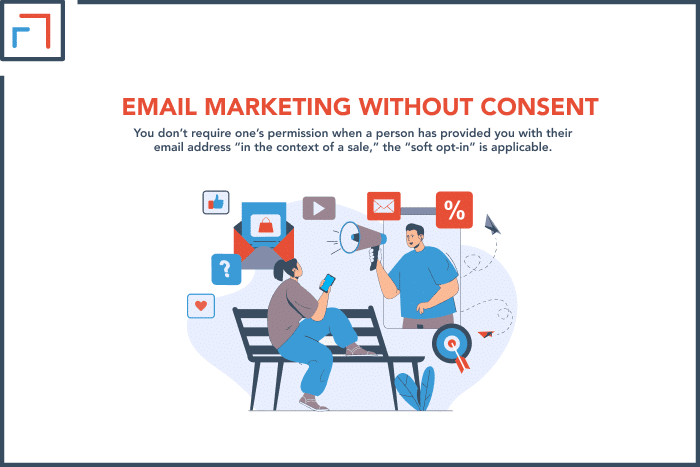Marketers often ask whether sending emails without permission is illegal. While this may not land you in jail, most email service providers have filters to restrain spam emails. But if all cold emails were against the law, marketers would find it challenging to run effective email marketing campaigns for millions of businesses.
Sending emails without permission is not illegal but can lead to flagging of your emails as spam. Many people view email as a marketing conduit that requires their consent. The US law requires some identification and consumer choice regulations concerning marketing emails.
Let’s explore the email marketing laws in different countries, outlining whether sending emails without permission is legal. Gain insight to make better, informed marketing decisions and turn your email marketing campaign into a hit. So, let’s start.
Sending Emails Without Permission: Is It Legal?
Yes! Federal law not only permits but also makes it entirely normal practice to send unwanted emails.
According to the Federal Trade Commission (FTC), more than 90% of US citizens receive direct commercial mail ads yearly.
It seems there’s no infringement on any regulations against sending uninvited messages, but a lot can go wrong.
The legislation in the US, UK, and Canada (CAN-SPAM Act and the CASL regulations) stipulates the requirements when sending emails.
I’ve written another article on the email marketing laws of UK and Europe to dive into the details that you can check out for further reading.
Email marketers must abide by these requirements to avoid paying hefty fines.
While this may seem frightening, if your company is real and you’re sending legitimate email campaigns utilizing appropriate marketing technology, you’re probably already compliant.
Depending on whether the recipient complains to authorities, you may be subject to fines and even imprisonment for failing to adhere to the CAN-SPAM Act’s rules.
So, let’s go over each component of the law one at a time so that we may comprehend why it is crucial to comply.

The chart below will help you compare the requirements of various laws in different regions.
| Consent | US (Federal) | Europe (Including UK) | Canada |
|---|---|---|---|
| Implied Consent | Not Applicable | Not Applicable (However, existing subscribers can get promotional emails via the soft opt-in options.) | Only when the email is publicly available or you have a pre-existing relationship with them |
| Express Consent | Applicable only when you previously opted out | Not applicable, except for existing customers | Not applicable unless there’s permission for consent |
| Unsubscribe Requirement | Mandatory | Mandatory | Mandatory |
| Exemption for Information available in public | Not Applicable | Not Enforceable | Only when the emails are relevant to the individual’s profession. |
| Unsubscribe Request deadline | 10 business days | 5 business days | 5 business days |
Repercussions of Sending Emails Without Permission
Without their consent, recipients of your emails are more likely to mark them as spam. They are also less likely to interact with them or make purchases.
Always get specific authorization; doing so is in your best interest.
As a result of spam reports, some subscribers may not receive your emails due to rigorous spam filtering or blacklisting. This may also harm the company’s image and impair deliverability.
Pay Fine & Penalty For Sending Emails Without Permission
According to Section 754(b)(1)(A):
“Any person other than an original source shall be liable for a civil penalty…”
This implies that anyone other than the message’s sender is liable for the fine. You could file a lawsuit if you were not the author of the spam email allegedly sent to the recipient.
How To Comply With These Email Marketing Laws In Your Next Campaign?
Neglecting email marketing regulations is equivalent to operating a vehicle while wearing a blindfold; you’ll crash at some point.
Even though it may seem difficult and practically impossible to adhere to every rule and law about email marketing, taking no precautions at all is also not the best course of action.
You can comply without using a lot of resources by concentrating on best practices.
After all, running the danger of incurring big fines and tarnishing your name with clients is not the recipe for a prosperous company.
1. Keep Up With a Clean and Simple Mailing List
Instead of purchasing a mailing list, create one using subscription forms and lead magnets.
Use double opt-in to ensure a quality list devoid of undesired addresses, spam traps, or inactive and inaccurate email addresses.
In addition, it’s critical to frequently purge your email list to stop sending messages to anyone who has already requested to be removed.

2. Pick Simple Opt-Out for Users
Every email should contain a clear opt-out link, and the unsubscription procedure should be simple. Users can choose to stay, receive emails less frequently, or keep everything the same.
3. Come & Record Consent
It’s crucial to document consent and provide an opt-in process to safeguard your company from possible infractions.
Maintain consent records in your organization’s internal records or customer data platform, and again, update your suppression list frequently.
4. Prompt and Respect Your Opt-Out Requests
A link to unsubscribe should also be provided, and opt-out requests should be handled swiftly.
For instance, you must comply with the CAN-SPAM Act’s deadline of ten business days. Use email marketing tools that may streamline this procedure to your advantage.
5. Proper Introduction
To make your emails easier for recipients to recognize, use your legal or business names in the “Sender” section.
To maintain openness, the footer of your email templates might contain header information such as your company’s logo and contact information.
Consider creating BIMI records as well, as they assist with open rates.
6. Clear and Transparent Subject Lines
Create straightforward subject lines that accurately reflect the email’s content because misleading subject lines can betray prospects’ trust.
This is in accordance with the law and follows accepted email marketing guidelines that safeguard the sender’s reputation.

7. Give Your Physical Address And Link To The Privacy Policy
To build credibility, be more trustworthy, and abide by rules, include links to your privacy policy and your physical address in every email.
As a result, your whole email marketing approach will likely improve, and you’ll be able to keep up strong email deliverability rates and prevent emails from being flagged as spam.
Email Marketing Without Consent: The ‘Soft Opt-In’ Option
If the “soft opt-in” is applicable, you don’t require one’s permission to send them commercial emails.
Where a person has provided you with their email address “in the context of a sale,” the “soft opt-in” is applicable.
Let’s say you want to send emails to customers promoting “similar offers” that your business offers.
So, when you request someone’s email address, which is followed in each marketing email, you provide them the option to unsubscribe from upcoming emails from you.
You don’t require permission in this situation.
Consequently, you may present a pre-ticked box during a checkout process that reads, “I would like to receive marketing emails about similar products and services.”

You May Not End Up in Jail BUT…
Mailing a list of individuals without their consent over time will result in complaints and a high unsubscribe rate that can potentially damage your reputation and make things challenging.
So, leverage the best email marketing strategies to tactically deliver your promotional emails to even those who are unlikely to unsubscribe.
Also, when running their campaigns, companies must be aware of and compliant with email marketing legislation.
There is no way to overstate how crucial it is to be aware and up to speed on these regulations because they safeguard customers’ data and businesses’ privacy.
You may prevent unintentional non-compliance, which carries a hefty fine, by being aware of these laws and using specialized email marketing solutions.
